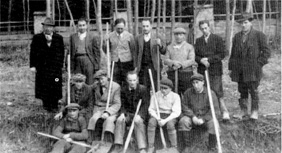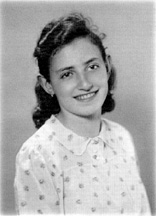
A new decree was announced in town. Jewish men were ordered to work on the banks of the Vltava River. Each spring, swollen from the winter’s rain and snow, the river threatened to overflow and flood the town. The only way to control it was to dredge the bottom of the river, digging up sand and rocks, filling boats with this dirt and then piling it on the banks of the river to hold back the water. In the past, hired laborers had done this job. But now, more than one hundred Jewish men were ordered to take over the work. Among them was Beda’s father. “How can the Nazis expect you to do this kind of manual labor?” Beda’s mother asked. “You are an educated man.”
“I’ll be fine,” Mr. Neubauer replied. “It will keep me busy, and make me strong. Besides, I’ll earn a bit of money. And you know how much we need money.”
His wife bit her lip but said no more. They were desperate for money now that he was no longer permitted to work. Besides, an order was an order. And so the very next day, at the crack of dawn, Beda’s father and the other Jewish men reported to the river for their first day of hard labor.

Jewish men were ordered to do forced labor, in this case dredging the river to prevent flooding.
The work was filthy and backbreaking. Soft-skinned hands, unaccustomed to shoveling and hauling rocks, became blistered and callused. Often, men fell into the freezing water, fully clothed. Beda’s father did not complain, but each night Beda and Frances watched as their mother tended to his cuts, sores, and aching muscles. Still, they all knew it was the only way to earn money.
Before the Nazi occupation, Frances had been attending a German school in Budejovice. But it was hard being the only Jewish girl in a school full of Christians. For some time, she had felt the other children turning against her. They had whispered behind her back, pointed at her, and called her names. “Dirty Jew,” some had jeered as they pushed and shoved her. Frances’ parents finally switched her to a Czech school, where things were better. But by the summer of 1939, she too was forbidden to attend school. She consoled herself by teaching Beda at home, as she had when he was just a little boy.
One day, Beda, Frances, and Reina made plans to go to the movies. Finally we’re doing something fun, thought Beda. “Be careful,” his mother said as the children went out the door. “Stay together and talk to no one.” It was becoming more dangerous for Jews to walk on the street these days, but the three young people hardly worried at all. They were going to see Snow White and the Seven Dwarfs, and they were too excited to think about danger. They sat in the balcony of the theater and reveled in the bright colors of the animation, their eyes wide with pleasure and anticipation. The only entertainment at home was radio, and movies with actors were in black and white. But this – this was magic.
The very next day, a notice appeared in the newspaper announcing that Jews were no longer permitted to go to the movie theater.
Soon, Beda and his family were forced to change apartments. The Nazis wanted to use their building because of its desirable location across from the railway station, since German soldiers were regularly coming and going by train. The Neubauers moved into a smaller apartment that they shared with another family. It was cramped, and thirteen-year-old Frances hated sharing her space. Understanding this, her parents began to talk about sending her away to live with a family overseas. She would be safe there, and maybe she would even find a way to send money back home.
In preparation for leaving, Frances had her passport photo taken, wearing a dark red dress with a stylish hat made by her aunt. But before she could go, a new law was passed. Jews could no longer leave the country. Frances’ family scrambled to make other plans. They decided that, if Frances could no longer attend school, perhaps learning a trade would come in handy. “You’re so interested in clothing and fashion,” said her father. “You could help your Aunt Elsa in her dressmaking business. We’ll send you to stay with her and learn the trade.” He wrote to Aunt Elsa, who said she would be glad to have Frances come to her home in Brno, about two hundred kilometers (125 miles) from Budejovice.

Frances at the age of fourteen, just before she left for Brno.
“But she lives so far away,” cried Frances. “I don’t want to leave.”
“Yes, it is a long way,” agreed her father. “But you’ll be safe there. You must go.”
And so Frances sadly said goodbye to her family. At the railway station she held onto Beda. “Promise me you’ll write,” she said.
Beda nodded. He didn’t trust himself to speak without crying.
“And promise you’ll keep reading,” Frances continued.
With that, she boarded the train. She had no plans for when she might come back, and no idea how long she would be gone.